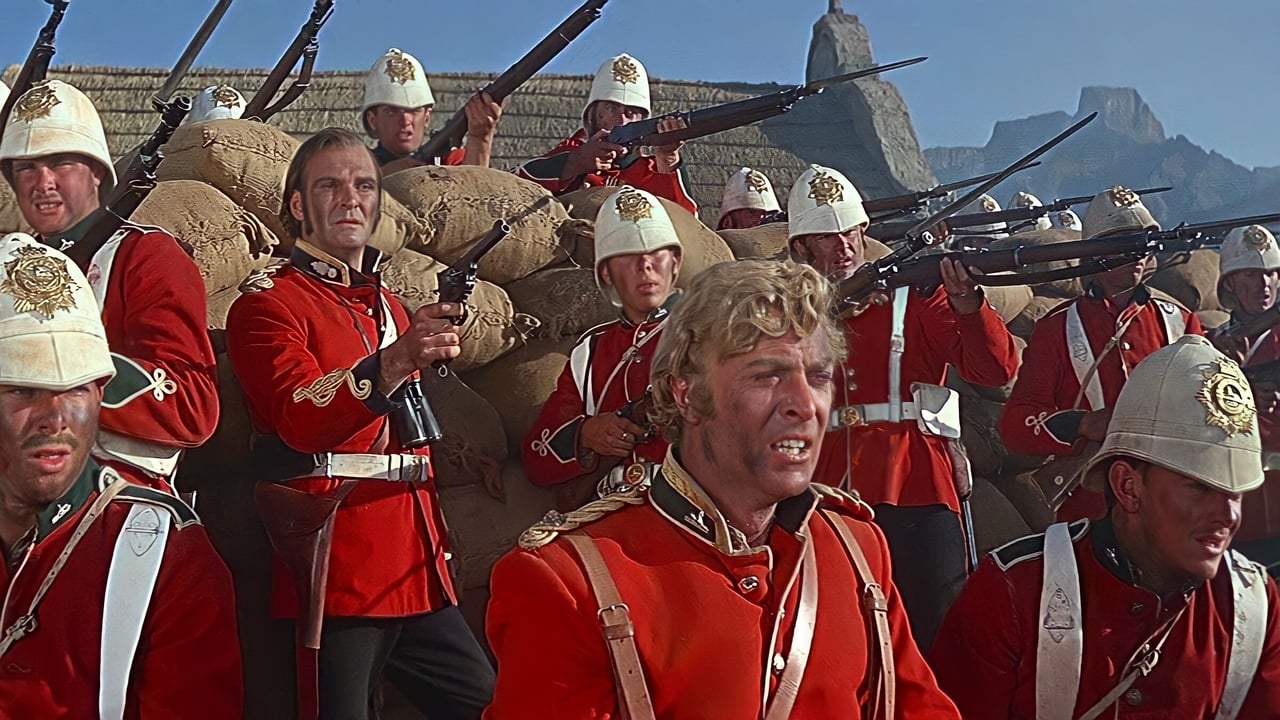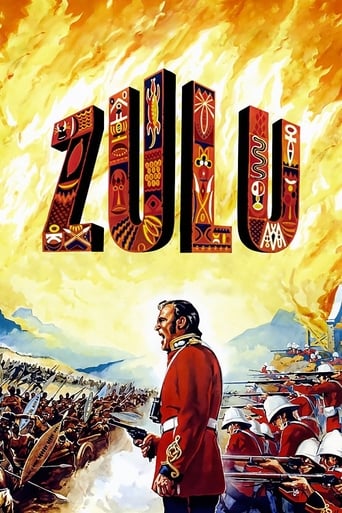

Amateur movie with Big budget
... View MoreThis movie was so-so. It had it's moments, but wasn't the greatest.
... View MoreIt's an amazing and heartbreaking story.
... View MoreThe movie's neither hopeful in contrived ways, nor hopeless in different contrived ways. Somehow it manages to be wonderful
... View MoreThis film didn't strike a chord with me, it felt very dull. I did not sympathize with any of the characters, nor did I learn anything about the British or Zulu culture in the late 19th century. Perhaps I was looking for the wrong thing when watching this film - I was expecting a historical fiction piece that would show both sides of the battle, but in reality, all I got was a long snooze fest battle scene that relies on nationalism to really enjoy.I feel like this is just a film that appeals to the people who like war movies because they show courage. Sure, this film shows the courage of these British soldiers, and it does it fairly well, but it also never developed any of these characters. I watched this film fairly recently, but if you asked me to name a character, I couldn't. With every other movie I've watched this year, I could probably name at least 3 characters from each one, but Zulu gave me no reason to learn about characters, the majority of the film was showing the British getting ready for, and then fighting the Zulus, which personally didn't appeal to me at all.
... View MoreZULU is a war drama, which brings a bloody clash between a small company of British troops and an overwhelming force of Zulu warriors. A insensitive story and an archaic tone may not be true. However, this is a fairly accurate report on a historical incident, which fosters a kind of traditional values. I think that an artificial melodrama and an occasional theatricality did some damage in the story. Zulu is a kind of recreation of the January 22, 1879, siege of Rorke's Drift in Natal, Africa. The army of 4 000 Zulu warriors destroyed a huge British garrison at the Battle of Isandlwana. Thereafter, they move to a small Rorke's Drift. A Royal Engineers officer is determined to stand his ground, despite having only a skeleton garrison at his command. He is in a quiet conflict, in terms of tactics, defense and eventual withdrawal, with an inexperienced lieutenant. An idealistic missionary and his beautiful daughter, can also pose a problem. Zulu warriors are getting closer...In this case, in addition to standard courage and unconvincing discipline, British troops exhibit a fear and disbelief. That is a very interesting contrast. I do not believe that the colonial expansion of some of the world's great powers, can bring a strong message. However, I've reviewed the film from some of my corners, which are related to that topic.An authentic scenery is perhaps the biggest advantage of this film. The battle is, regardless of theatricality, realistic. The costume design is top notch. The visual and sound effects are not bad. A constant tension is riddled with cunning interruptions, such as ritual dances or black comedy situations.Stanley Baker as Lieutenant John Chard has got into something big. However, he has responded well to the task, but his courage and willingness are highly questionable. Michael Caine as Lieutenant Gonville Bromhead is inexperienced, but still calm and brave in the most difficult situations. Nigel Green as Colour Sergeant Frank Bourne is a traditional, solid and equal arm of one commander. Mr. Green has offered a very good performance. James Booth as Private Henry Hook is a thief and coward, and perhaps the man who has seen enough of war and killing. Jack Hawkins as Reverend Otto Witt is intoxicated by religion. His anxious daughter (Ulla Jacobsson) is torn in all directions.The Zulus instead sing a song to honour the bravery of the "defenders" before departing. Reason has prevailed, at least on one side. Others will enjoy the delusion of victory.
... View MoreWhen "Zulu" opened in Sydney in 1964 it had one of those big premieres that military epics received back then: searchlights, red carpet, a band and guests wearing medals. Shortly after, I took my brother to see it. "Zulu" ticked all the boxes for us.From Richard Burton's opening narration to his listing of the names of the Victoria Cross winners at the end, we were rapt.As well as the battle, those bare-breasted Zulu girls did not go unappreciated by a couple of young lads. You didn't see a lot of that sort of thing on the screen in those days. The filmmakers obviously got away with it under the old National Geographic Magazine rule of it's OK if it's the natural attire of the culture, it didn't stop them being hot though.The film still stands up even if the censorship of the day kept it relatively bloodless. Demonstrations show what a round from a Martini Henry rifle can do to a watermelon, no doubt it would have had the same spectacular effect on a human head. An assegai in the belly would not be as clinical as depicted in the movie either. But the best bits of the film were often the tense scenes waiting for things to happen and the one where the men drown out the Zulu chant with "Men of Harlech". I haven't a drop of Welsh blood, but that scene always puts a lump in my throat.The film is classy. Breathtaking photography, terrific performances from top to bottom and an awesome score by John Barry; music to perform heroics by.The film was a hit in Australia, but something unexpected happened not long after. In 1966, D Company, 6th Battalion Royal Australian Regiment found itself surrounded by up to 2000 Viet Cong in a rubber plantation at Long Tan in South Vietnam. There were 108 of them, about the same number as the 24th Regiment at Rorke's Drift. They held off attack after attack. Instead of mealie bags they brought down artillery fire, but the fighting was at close quarters as they held their perimeter. By the time help arrived, 18 of them were dead (17 at Rorke's Drift) while the enemy lay dead in the hundreds. Controversially, there were no Victoria Crosses although more than one was earned. Years later, the company commander likened the battle to Rorke's Drift. But I wonder if while the battle was on, did it flash through the minds of the blokes who had seen the movie that what they saw depicted on the screen they were now experiencing for real?Would anyone make a film like "Zulu" today? Possibly it would be just too un-PC. Most battles on the screen these days are fought vicariously through intergalactic stormtroopers or by the denizens of "Game of Thrones".However, historical rights and wrongs aside, I still think "Zulu" rocks; it's simply an exceptional piece of filmmaking.
... View MoreZulu is a fine example of what a war movie should be. There's no attempt at tying in unnecessary back story's, oddly misplaced romances, or blood & guts and cgi action and explosions for the sole sake of transitory visual impact as opposed story.Unfortunately few modern films of the genre can match the classics of the 50s and 60s when the story was #1 and the money makers of marketing departments were there to sell the film on merit as opposed to mere profitability - Saving Private Ryan is one good example of a recent film that makes the grade, Pearl Harbour tells the 'Hollywood war story' where truth falls behind a sloppy badly after romance (Those who worked on Tora! Tora! Tora! - a vastly superior movie of the same events - must be turning in their graves!)The mention of Tora! Tora! Tora! is deliberate. Its from the era of film where both story and events were displayed from a realistic human point of view as opposed to what can be rewritten and shown through CGI. Here just as in Tora! both sides in the Battle of Rourkes drift are accurately displayed as brave, valiant warriors but not without human flaws. There's no attempt to portray the natives as a 'lesser savage animal' but merely as an alternative representation of the warrior spirit. It may be noted just how little gore is shown in any scene compared to modern equivelents, probably as this is about the battle not how much blood is on show in an attempt to crave notoriety amongst potential audiences. Death, and killing, is not treated as a game and whilst each army treats individual losses differently they both respect the sacrifices made by their own as well as the others sides warriors. What you certainly do not see is gloating over kills.The acting is good, and despite the inevitable screen treatment is based upon solid characters following scripts and scenes that closely match records of the original battle - being a true life battle its nice to see it not sugar coated with incredible feats of heroism written to suit, or trying to demonstrate the absurd notion that this was somehow a naive uneducated native contingent up against obviously superior regular colonial armyAs noted by others this wasn't a battle where either side came out as definitive winner or loser. The film follows as there is no victory celebrations simply a mutual respect as the two sides part ways. There's nothing patriotic in the movie about how the British slaughtered the miscreant natives and the viewer is left in no doubt that had the battle continued losses would have been very great on the Zulu side, but absolute on the British - anyone winning this battle would no longer have been an effective unit and thus worthy of bragging rights. ... Just for once its nice to sit back and watch a realistic war movie, based on real event, without mass cgi, consulted and unnecessary subplots - or worse still rewriting history to ensure specific characters are standup hero's, both real and worst still people who are inventions of the writers minds!This is how it should be done - and it was all done by the British about the British in a battle they didn't win in a war they aren't proud of.
... View More